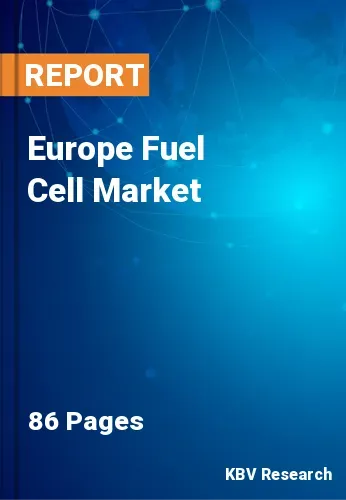The Europe Fuel Cell Market would witness market growth of 18.8% CAGR during the forecast period (2022-2028).
The Fuel cell market is expected to grow due to its wide range of applications as a portable electricity source, including power for test equipment, moveable battery chargers, and consumer electronics. Customers will gravitate toward these cells due to their ability to be refilled in minutes as opposed to batteries that take longer to recharge. Furthermore, by replacing batteries with DMFCs, battery charging infrastructures will be eliminated, resulting in increased product adoption.
Consumer awareness of clean energy technology and solutions is developing, and regulatory standards and mandates are being implemented more frequently to encourage the usage of fuel cell electric vehicles in the transportation sector. Additionally, changing customer preferences, combined with technological and modern improvements, are prompting key industry players to expand their charging networks.
By 2030, the German fuel cell market is expected to increase to 262 MW. Due to the growing user base, the quick commercialization of FCEVs will boost industry statistics. The industry will grow faster if both public and private organizations make significant investments in the extension and development of hydrogen refueling networks. Furthermore, the fuel cell business landscape is expected to be driven by the adoption of strict rules and pollution reduction targets. In 2021, for example, the German government adopted an Energy Act amendment draught containing additional clauses aimed toward the development of hydrogen networks. It will continue to focus on strengthening the country's hydrogen infrastructure.
Fuel cell-based systems have been widely used in the transportation industry in the region, from cars to trucks to heavy-duty vehicles. The European Union's constant efforts to decarbonize mobility in the region are the major driver for such a change. According to Eurostat, the share of renewables in gross energy consumption in the transportation sector was around 10% in 2020, which was a significant achievement for the EU, which had set a similar goal. They have now set a new goal of increasing the percentage to 14% by 2030. As a result, numerous efforts are presently underway to accelerate the adoption of green-hydrogen technology in the transportation industry.
The Germany market dominated the Europe Fuel Cell Market by Country in 2021, and would continue to be a dominant market till 2028; thereby, achieving a market value of $464 Million by 2028. The UK market is estimated to grow at a CAGR of 17.8% during (2022 - 2028). Additionally, The France market would display a CAGR of 19.7% during (2022 - 2028).
Based on Product Type, the market is segmented into Proton Exchange Membrane Fuel Cell (PEMFC), Solid Oxide Fuel Cell (SOFC), Molten Carbonate Fuel Cell (MCFC), Phosphoric Acid Fuel Cell (PAFC), and Others. Based on Application, the market is segmented into Stationary, Portable, and Transport. Based on countries, the market is segmented into Germany, UK, France, Russia, Spain, Italy, and Rest of Europe.
Free Valuable Insights: The Global Fuel Cell Market Size will Hit $11.9 Billion by 2028, at a CAGR of 19.2%
The market research report covers the analysis of key stake holders of the market. Key companies profiled in the report include Ballard Power Systems, Inc., Plug Power, Inc., SFC Energy AG, Bloom Energy Corporation, Cummins, Inc., Hyster-Yale Materials Handling, Inc., Doosan Fuel Cell Co., Ltd., Intelligent Energy Limited (Meditor Group), FuelCell Energy, Inc., and Nedstack Fuel Cell Technology BV.
By Product Type
By Application
By Country

Our team of dedicated experts can provide you with attractive expansion opportunities for your business.

